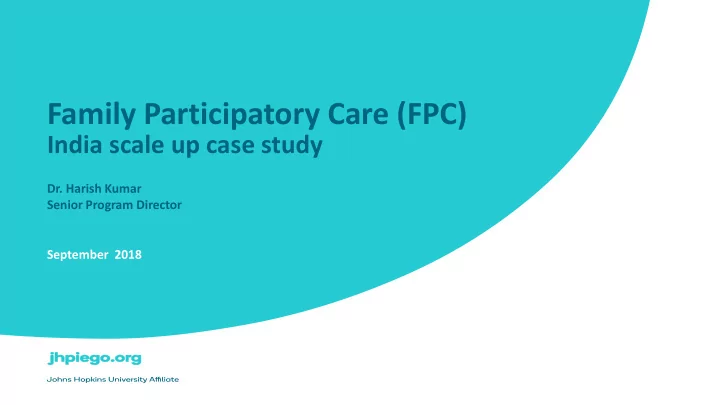

Family Participatory Care (FPC) India scale up case study Dr. Harish Kumar Senior Program Director September 2018
Phenomenal Scale up of FPC in India!!! Parents attended FPC Sessions Parents attended KMC Sessions FPC Scaled up in 69 FPC centres with country budgets in one year Source : SNCU data from Government of India (Jan 16 – Dec 17)
Rationale for designing FPC/FCC Assessment of Quality of care for children Impact Evaluation of the Norway India in District Hospitals in India Partnership Initiative Phase-II Issues with High mortality quality of in SNCU Discharged care in newborn (6-10 district %) facilities Low KMC rates (1-2%) No implementation model in LMIC in public health approach RML work showed no increase in nosocomial infection- a major concerns of implementers
FPC Timeline • State PIP • NIPI Governing board approvals • Scale up in 69 • “Design Thinking” • Preliminary assessment 2014 • 2016 (Till June) 2015 2017 • Problem Identification • 5 pilots • RML resource centre • Concurrent advocacy (Local & Global experiences)
Design Thinking Approach Additional Work Load? • Nosocomial Infection? • SNCU SHS NIPI Team NIPI RML Team Synthesize Discussions RML interpret with GOI data, human- state/SNCU/ SHS centered ANM/ASHA/ TAG information MOTHER to define the core problems Nurturing Care Framework
FPC Continuum of Facility & care Model Facility Community Improving Parenting Improving Health Improving Providers practices Systems skills Practices Attitude Infrastructure
FPC: Follow up in community Care at SNCU Outcome Follow up of 9500 ANM + ASHA new born after discharge shows 1. Adherence (compliance with mortality<1% discharge instructions) Care at home 2. Continue support for KMC & by mother LBW feeding 3. Play & stimulation (ECD) 4. Prompt detection of danger signs & timely referral to appropriate facility
Family Centred New-born Care: Key Implementation steps 1. Convincing key stakeholders 2. Resource center: RML at 9. Advocacy for National, DH at scale Only State State Capacity Building National & State both 8. Quality 3. Identification Key assessment of a ‘champion’ Implementation Steps National and State 7. Recording 4. Gap assessment & Governments involved at formats refurbishment all steps 5. Development of tools: At State 6. Monitoring - Local No additional HR framework translation & iteration
Some Key Steps FCC Orientation, Odisha Advocacy with State Governments Call to Action, Delhi Operational Guidelines in State Level Launch in local language Rajasthan
Results achieved in 5 Model FPC centres Indicator 1 : % Mothers conducted at least 1 facility follow-up visit Indicator 2 : % Mothers providing KMC at home SNCU Online SNCU Online before Oct 15 -Dec 16 Oct-2015 (n=5762) (n=5762) OPM Baseline NIPI Periodic Assessment-2013 Assessment Dec (n=449) 16 (n=200) Adherence especially Breast Feeding & KMC Significantly improved
FPC Qualitative & Quantitative Assessment in 38 facilities of India • Objective Jan to Mar-2018 › Assess the current status of FPC implementation 69 Facilities Training Conducted › Bottlenecks & challenges in quality implementation of FPC Submitting Reports 43 • Tools › Health Provider-Interview › Facility checklist Assessed 38 › Data verification › Client satisfaction & knowledge
FPC Assessment-Facility observation Adequate supplies for Chairs available for Family member allowed in Family members observed hygiene entry protocols family members SNCU (n=240) providing FPC (N=190) (N=38) (N=38) 79% 72% 84% 95% FPC Data Recording Availability of AV Structured training session Training space available Started (N=38) equipment (N=38) plan displayed (N=38) (N=38) 95% 42% 97% 100% Source : NIPI Assessment Jan to Mar-2018
Key Findings • Almost all the mothers suggested FPC should start everywhere !!!!. • All units were functional for FPC (72% eligible newborns receiving FPC) • Enabling logistics available at most places • In most of the facilities FPC sessions happening regularly • Breast feeding & KMC practices have increased
Learnings & challenges! • FPC is doable in public health framework for nurturing care to most vulnerable • Winning strategy for improving KMC & empowering families • Convincing key stakeholders single most important step as paradigm shift! • Adequate Infrastructure • Identifying a champion at each institutional level
Recommend
More recommend